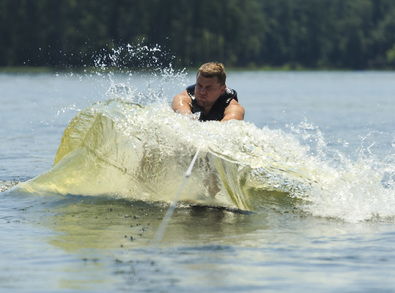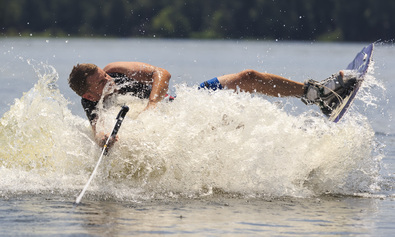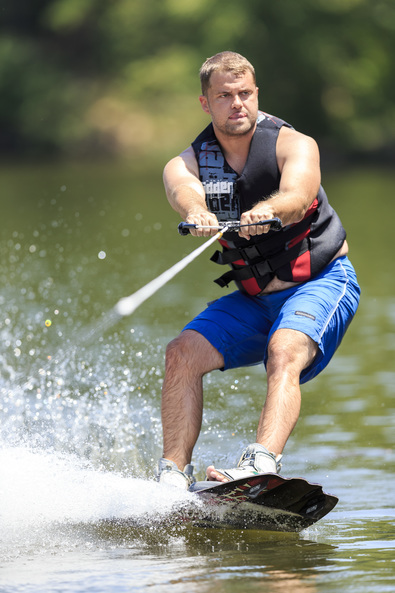The 5 Year Process of Learning How to Wakeboard
Why Being Aware of How You Learn Makes Everything Easier to Learn
I tried wakeboarding in 2006 for the first time at High Rock Lake outside of Lexington, NC. At the age of 22, I believed I could do anything. In terms of social, physical and intellectual confidence, I was at a peak. Along with that, I knew how to snowboard. The transition seemed like a given. Snowboarding and wakeboarding begin the same way with the bottom of the board pointed at the boat. This is what I call "plow" position. Plowing while snowboarding is what you do until you slowly turn the board downhill. When I attempted to wakeboard for the first time, I was surprised at how badly I failed.

My problem was that I could not "pop up" out of the water. My friend Michael Plyler tried to explain to me how to "pop up," which was that you were to let the boat pull you up. While I was plowing my board, snowboard style, I felt like the rope was going to tear my arms off. (I found out later that this feeling of your arms ripping off is normal for two seconds.) The rope handle would slip out of my hands and the boat would speed off. Failing to "pop up" was frustrating and embarrassing since I was a confident 22-year-old college guy who seemed to "get" things easily. After about five or six attempts the process began to feel hopeless and just laid there in the water waiting on Plyler to pull the boat around. What could be the alternative when the learning process felt frustrating, embarrassing and hopeless? There must be a method or habit of learning when things get hopeless during the beginner stage, otherwise you will quit or say "My arms are tired" and get back in the boat. That's what I did on that day in 2006. I got back in the boat.

Writer Dorthy Sayers wrote an essay arguing that people need to learn how to learn. She argues that if we can understand how we learn one subject(or activity or task), we can more easily learn other subjects. In her essay the "Lost Tools of Learning" she says: "To learn six subjects without remembering how they were learnt does nothing to ease the approach to a seventh; to have learnt and remembered the art of learning makes the approach to every subject an open door." Sayers goes on to explain that if children can become self-aware of how they learn about science or history, the process of learning can become easier when they enter algebra class or attempt to wakeboard. They will "get the mastery of a new subject in half the time and with a quarter of the effort expended by the person who has not the tools at his command." If we understand our own learning habits, we can apply them to academic subjects, everyday skills or new hobbies.
If people have a personal, set method for learning new things, it can overcome some of the ingrained "I can't do it" thinking and inner dialogues that prevent them from ever trying to do new things. For instance, I would like to learn to play the guitar. Yet often times I talk myself out of attempting to play because I feel it is un-learnable because people who play instruments well seem have learned them at a young age, as if you don't learn an instrument by the age of 21, your chance has passed. My second excuse to not try to play is that I am not genetically inclined to make, understand or play music. Both of these could be excuses not to do something, yet both seem false.
I cannot use the genetics excuse with wakeboarding, because my dad was a great water-skier. That excuse was out. Yet when learning new things, this is one the easy exits: "Yea, it's not in my blood." Another excuse was the age excuse because my friend Michael Plyler could do flips and tricks on a wakeboard since he was 17 years old, yet I could not stand up at 22 years old. It wasn't a good idea to compare myself to Plyler, because he is the best wakeboarder I know. Things like "it is not in my blood" and "I am too old to learn" are too potential barriers to learning anything.

I kept trying to wakeboard. It wasn't a disciplined effort, but I went whenever I was invited. I tried once every summer at High Rock Lake with Michael in 2007, 2008, 2009 and 2010. I remember 2008 in particular because Plyler had a specialized wakeboarding boat with elevated speakers and the back of the boat somehow made it easier to stand up. Yet still, face-plants, plowing and embarrassment were the norm. I was unable to "pop up." I concluded that I was getting too old.
In 2011 I went to Hi-Co Lake with my friend Jacob Apple. He was moving to Colorado and I went his family's lake house for a going away party. We went out on the lake with his brothers to wakeboard about 3pm. When my turn came, I tried standing up but after about 4 tries I felt guilty about making everyone watch me not wakeboard. So I got back in the boat. We went in to eat an early dinner and then went out around 6:30pm. Jacob's brother kept explaining to me to let the boat pull me up and to quickly turn my hips. It was this quick move after plowing for one second that you do all at once, kind of straightening your back out and standing up all at once, yet keeping your arms completely straight. All of the sudden I stood up, and after realizing that I actually stood up, I felt so happy that I did a face-plant in the water. I did it. At 27 years old, I did it!
We tried again, and I stood up again, something happened and I was able to stand up for about 45 seconds in the water. As the sun is setting at Hi Co Lake on an July night, I finally figured out how to stand up and wakeboard. By the end of the night, I could go back and forth across the wake and some of my snowboarding skills started to kick in.
I "got it." This felt very good. I got back in the boat proud and relaxed.
Cognitive Psychologist Daniel Willingham argues that "It is virtually impossible to become proficient at a mental task without extended practice." The process of practice (or drills) pushes what is in our working memory to transfer to our long term memory. Willingham says that what we can hold in our "working memory" is limited and this is a problem. Once we learn the details of a particular process or action, it becomes long-term memory and bring it up when needed. With new tasks, it takes up a lot of our working memory space, which makes us think slower. Our brains are attempting to focus on multiple complex tasks, all at once, which is why I can't have a conversation with someone while learning to tie my shoe because my brain needs full attention. At 31, now that I can tie my shoes, I can have a conversation with someone because the steps of tying my shoe are in my long term memory. Likewise when I am learning to wakeboard, there are multiple things going on at once (plowing, holding on, turning my hips, keeping my arms straight) which all take mental thought. Practicing helps you to internalize each of these so you can focus on more complex ideas.
Willingham stresses that you want "transfer" to happen, when things move from working memory to long term memory. How do you get transfer to happen? Practice. If you practice a particular thing, certain mental processes can become automated and require little to no thinking at all.

On July 10th 2015, I went wakeboarding again. It had been 4 years since I went, so I had to teach myself once again. This time, I had to think hard about hanging on. I had to yell at myself saying "Hang on you idiot!" I also had to keep my arms straight, plow a little bit and quickly turn my hips(this step is nearly impossible to explain). Those are four steps I was thinking about before ever popping up out the water. My working memory was trying to internalize those three steps. I failed to stand up the first 4 times we tried. I was pissed, as usual. But I had to go a few times to remember the basic steps.
I didn't stand up again till the 5th try, after internally yelling at myself to hang on.
After my brain was able to stop thinking so much about hanging on, I could focus on going from plowing and instead focus on actually standing up. I was experiencing memory transfer as I was on the lake: 1. Hang on, 2. Plow for two second, 3. arms straight, 4, turn your hips. Then once I got those, I started to integrate what to do when I stood up: 5. Stay cool 6. Keep my back weigh on my back foot 7. Keep my weight back. After popping up about 2-3 times, I began to think less and be able to just stand there and enjoy it, and then it started to feel like snowboarding.
Foo Fighters lead singer Dave Grohl once said "Why not find the thing you don't know how to do it and do it?" Grohl said this in a Rolling Stone interview in reference to a documentary he is making, a field he is completely new to, after being a successful musician for nearly 30 years. Of course in order to do the thing you don't know how to do-----you must find a method for learning. I am not a perfect wakeboarder, but I know for a fact that practice can make me competent at things I want to do. For me to teach myself something, I must believe I can do it and I must practice a whole lot. Both of these things are hard to do. But that is my own personal understanding of how I learn things. Practice and belief. That's my own personal philosophy of how I learn, but I must have a personal philosophy of learning so I can believe I can learn. Everyone will probably have their own philosophy-----but if someone doesn't have one, he or she will likely be less likely to try to learn things they want to do. That is no fun. In the end-----the more things American citizens know how to do, we better off we all are. What do you want to do?
Photo Credits to Smith Hardy